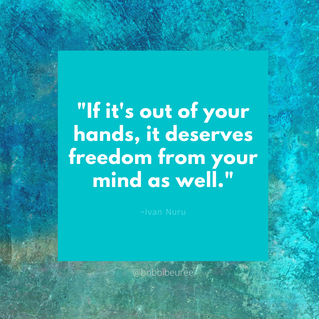|
We're often not aware of the things we're doing that increase worry and anxiety. Habitually and consistently watching the news or mindlessly scrolling social media, for example, takes a toll on us, whether we realize it or not. The more we focus on scary or upsetting things that are beyond our control, it just makes sense that we will feel more anxious. It can make us feel powerless and it puts our nervous system on high alert. It then gets stuck there as worried thinking takes over. Initially, worry was something your mind started doing to try to help you feel more in control and to ease your emotional discomfort. Even if, over time, worry has caused suffering for you, the mind's initial intention was to be helpful and protective. It took on the job of planning, plotting things out, imagining worst-case scenarios – always wanting to feel prepared for what may come. It is constantly looking for a sense of safety, and sometimes worrying meets that need. You’ve given your mind something to do – to dwell and guess what comes next. But your mind can’t figure things out – that’s not possible. The mind is simply pulling from what it knows, what it has conditioned and programmed into it, and adding on some of what is actually going on. It will then start making up stories about what the future holds.
But that would be like saying you are intentionally beating your heart, digesting your food, or healing the cut on your hand. All these things are happening to you, but it’s not because you’re intentionally directing them. It is the exact same thing with worried thinking. It is happening TO you in that it is not a conscious choice. We cause suffering for ourselves when we allow our habit of worry to go unchecked. We rob ourselves of the peace that actually exists in the present moment. And we live out our worst fears in our minds, causing us to experience the very thing we’re worried about, or even terrified of, experiencing.
Worry can range from feeling uncomfortable to being debilitating. If you allow yourself to stay in a state of stress, with stress hormones pumping through your body, it negatively impacts every system that is vital to your health and well-being. And beyond that, you can’t feel love, joy, or a healthy connection with others when your mind is in survival mode. It’s just not possible. People often say that they know it’s not helpful to worry but that they can’t stop. You can! It’s a choice. But that’s not to say it’s not a difficult habit to break. You are pulling away a barrier, a defense mechanism you have likely used for a long time to cope with uncomfortable feelings. Ask yourself, “do I want to continue to let my nervous system be negatively impacted in this way?” When your body is in stress-mode (which is what is happening when you worry), you remain in survival mode. Your body is on high alert, meaning it is unable to move to “Rest + Digest” mode or do all the things that keep us healthy. What can you do when you notice yourself falling into worry? First, try to acknowledge that it is your mind doing what a mind does. Remind yourself that it can't figure out the future. It will just tell scary stories in an effort to prepare you for the worst.
Getting caught up in a cycle of worry keeps us trapped in survival mode and limits our ability to experience positive emotions, like joy, hopefulness, confidence, enthusiasm, and more. Worry is not who you are - it is just a habit that keeps you stuck. You CAN make changes that will allow you to feel more peace of mind and a heightened sense of wellbeing! Learn More about Core-level Coaching AuthorLearn more about Bobbi Beuree, Nova Scotia-based Coach + Facilitator
1 Comment
Gloria Beuree
2/9/2022 01:41:02 pm
Very well explained, great job.
Reply
Your comment will be posted after it is approved.
Leave a Reply. |
AuthorBobbi Beuree, Certified CAN Coach + Facilitator is located Nova Scotia and provides interactive 1:1 coaching services, as well as group coaching events. Archives
March 2024
Blog list: |
- Home
- About
- Connect
- Blog
- Why Coaching?
-
Key Topics
- Stress Management
- Practicing Healthy Self-Care
- Dealing with Difficult Emotions
- Thinking Traps and Limiting Beliefs
- Procrastination and Lack of Motivation
- Gaining Control Over Habits
- Life Direction
- Mindfulness
- Emotional Intelligence
- Self-Management
- Interpersonal Relationships
- Anxiety
- Perfectionism
- Self-Esteem + Self-Confidence






